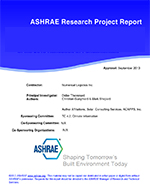In this project, the Principle Investigator’s group at Florida International University (FIU), Miami has conducted an experimental investigation of the heat transfer and pressure drop of compact heat exchangers with louvered fins and flat tubes at low air-side Reynolds numbers. The main objective of this research is to develop air-side heat transfer and friction factor correlations when face velocity are low, i.e. in the range of 20 < ReLp < 200, where ReLp is the Reynolds number based on louver pitch, Lp. The scope of work includes literature review on the previous work, design of experiment, test facility modification, experimental measurement, data reduction and reporting.
In the experimental study, an existing heat exchanger wind tunnel test facility at FIU was modified and used to generate the flow and heat transfer conditions required for this project. 26 sample heat exchangers that cover a wide range of geometrical parameters have been acquired and tested based on what is available on the market.
New correlations for Colburn factor j and Fanning friction factor f have been developed using eight non-dimensional parameters based on the experimental data. Within the investigated parameter ranges, it seems that both the j and f factors are better represented by two correlations in two flow regimes (one for ReLp = 20 – 80 and one for ReLp = 80 – 200) than single regime correlation in the format of power-law.
Although power-law formats are used in both flow regimes, the coefficients in the correlations are different in both regimes for both j and f factors. This is a confirmation that air flow and heat transfer at very low Reynolds numbers could behave differently from that at higher Reynolds numbers.
The project has resulted in heat transfer and friction factor data or correlations that will help fill the knowledge gap at low air-side flow rates for air-cooled compact heat exchangers. These data or correlations will be used by engineers to effectively design more efficient heat exchangers for commercial and residential AC systems.
It should be noted that the compact heat exchangers used in the present study have the type of corrugated louver fins forming triangle channels for airflows. It is suggested that future research using other types of louver fin configurations are conducted to further confirm the unique flow and heat transfer behaviors at low Reynolds numbers. In addition to accurate experimental measurements, computational fluid dynamics could also be used for further systematic studies on this subject.
Citation: ASHRAE Research
Product Details
- Published:
- 2016
- Number of Pages:
- 95
- Units of Measure:
- Dual
- File Size:
- 1 file , 4.6 MB
- Product Code(s):
- D-RP-1535


